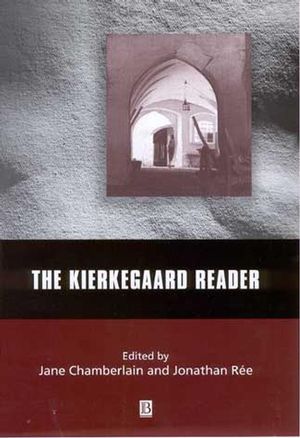|
Textbook
The Kierkegaard ReaderISBN: 978-0-631-20468-8
Paperback
416 pages
July 2001, ©2001, Wiley-Blackwell
 This is a Print-on-Demand title. It will be printed specifically to fill your order. Please allow an additional 10-15 days delivery time. The book is not returnable.
|
||||||
Introduction: Becoming a Philosopher.
1. Journals and Notebooks:.
2. The Concept of Irony (1841):.
For Orientation.
Irony after Fichte.
3. Either/Or (1843):.
Crop Rotation.
4. Fear and Trembling (1843):.
Preface.
Attunement.
Problema I.
Problema III.
Epilogue.
5. Repetition (1843):.
A Report by Constantin Constantius.
6. Philosophical Fragments (1844):.
Preface.
Interlude.
Is the Past More Necessary Than the Future? Or: Does the Possible Become More Necessary by Becoming Actual?.
?1. Coming into Existence.
?2. The Historical.
?3. The Past.
?4. The Apprehension of the Past.
7. The Concept of Anxiety (1844):.
Preface.
Introduction.
Anxiety as the Consequence of That Sin Which is Absence of the Consciousness of Sin.
Anxiety as Saving Through Faith.
8. Prefaces (1844):.
Preface.
9. Concluding Unscientific Postscript (1846):.
Possible and Actual Theses by Lessing.
Thesis 1.
Thesis 2.
Thesis 4.
Actual Ethical Subjectivity.
Towards an Understanding with My Reader.
A First and Last Explanation.
10. My Work as an Author (1850, 1859):.
On my Work as an Author.
The Accounting.
The Point of View for my Work as an Author.
Introduction.
Part One:.
A: The Ambiguity or Duplicity in the Whole Authorship.
B: The Explanation.
Part Two: The Whole Work of Authorship.
Chapter One.
A: The Aesthetic Works.
B: Concluding Unscientific Postscript.
C: The Religious Works.
Chapter Two: The difference in My Personal Mode of Existence.
A: In Relation to the Aesthetic Works.
B: In Relation to the Religious Works.
Chapter Three: The Share Divine Governance Had in My Authorship.
Epilogue.
Conclusion.
11. Johannes Climacus, or De Omnibus Dubitandum Est (1842, 1869):.
Introduction.
Part One, In which Johannes Begins to Philosophise with the Help of Traditional Ideas.
Introduction.
Chapter One: Modern Philosophy Begins with Doubt.
?1 How Should the Third Thesis be Understood Literally.
?2 How Did it Come to Pass that Modern Philosophy Began with Doubt?.
(a) Was it by Accident That Modern Philosophy Began with Doubt?.
(b) Was it by Necessity that Modern Philosophy Began with Doubt?.
?3. Intimations.
Chapter Two: Philosophy Begins with Doubt.
?1. Is the First Thesis Identical with Thesis Three?.
?2. How Does the Individual Relate to the First Thesis?.
(a) How Does an Individual who Affirms the First Thesis Relate to It?.
(b) How Does the Individual to Whom the First Thesis is Proposed Relate to the Individual who Propounds It?.
Chapter Three: In Order to Philosophise One Must Have Doubted.
Part Two, In Which Johannes Tries to Think Propriis Auspiciis (On His Own Account) De Omnibus Dubitandum Est.
Introduction.
Chapter One: What Is It To Doubt?.
?1. How Must Existence be Constituted in Order for Doubt to be Possible?.
Kierkegaard's Works and their Authors.
Bibliography.
Glossary.
Index.



